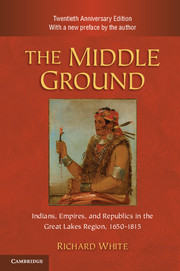Book contents
- Frontmatter
- Contents
- List of abbreviations
- Preface to the twentieth anniversary edition
- Introduction
- 1 Refugees: a world made of fragments
- 2 The middle ground
- 3 The fur trade
- 4 The alliance
- 5 Republicans and rebels
- 6 The clash of empires
- 7 Pontiac and the restoration of the middle ground
- 8 The British alliance
- 9 The contest of villagers
- 10 Confederacies
- 11 The politics of benevolence
- Epilogue: Assimilation and otherness
- Index
3 - The fur trade
Published online by Cambridge University Press: 05 June 2012
- Frontmatter
- Contents
- List of abbreviations
- Preface to the twentieth anniversary edition
- Introduction
- 1 Refugees: a world made of fragments
- 2 The middle ground
- 3 The fur trade
- 4 The alliance
- 5 Republicans and rebels
- 6 The clash of empires
- 7 Pontiac and the restoration of the middle ground
- 8 The British alliance
- 9 The contest of villagers
- 10 Confederacies
- 11 The politics of benevolence
- Epilogue: Assimilation and otherness
- Index
Summary
You have forgotten that your ancestors in former days used earthen pots, stone hatchets, and knives, and bows; and you will be obliged to use them again, if Onontio abandons you. What will become of you, if he becomes angry?
Nicolas Perrot, MemoirThe universal modeler attributes to exotic economic practices a motivation and intentionality which is our own.
Stephen Gudeman, Economics as CultureNormally, any discussion of the fur trade is segregated from the wider spectrum of social relations and exchanges between Indians and whites. Yet the exchange of goods is not so easily fenced off into an economic realm whose rules are at once distinct from other aspects of life and present in all societies. After all, goods changed hands virtually every time Frenchmen and Algonquians struggled to unite against common enemies; or met to resolve the murders between them; or asked for aid in surviving hunger, disease, droughts, and blizzards; or made love or married. Such exchanges normally either are excluded from considerations of the fur trade or are reduced to a purely economic relation. It is just as possible, however, to create a counter-image in which the fur trade proper is merely an arbitrary selection from a fuller and quite coherent spectrum of exchange that was embedded in particular social relations. The fur trade was a constantly changing compromise, a conduit, between two local models of the exchange – the French and the Algonquian.
- Type
- Chapter
- Information
- The Middle GroundIndians, Empires, and Republics in the Great Lakes Region, 1650–1815, pp. 94 - 141Publisher: Cambridge University PressPrint publication year: 2010



